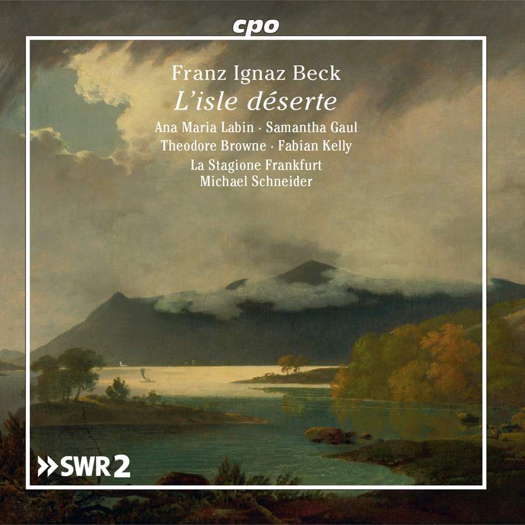- Karen Keltner
- Reginald Twiddlebrain
- Karl Amadeus Hartmann
- Henryk Szeryng
- Haydn: The Creation
- George Vass
- Petr Altrichter
- Terence Helmer
ARTICLES BEING VIEWED NOW:
- Régine Crespin
- Hector Berlioz
- Ruth Railton
- Marián Varga
- Profile. A Very Positive Conductor - Paul Bodine talks to Los Angeles Opera's Music Director Designate, Domingo Hindoyan
 UPDATES: There's a new feature every day at Classical Music Daily. Read about the various ways we can keep in touch with you about what's happening here.
UPDATES: There's a new feature every day at Classical Music Daily. Read about the various ways we can keep in touch with you about what's happening here.

A Universal Happy Ending
GERALD FENECH reviews a new recording of Franz Ignaz Beck's opera 'L'isle déserte'
'Michael Schneider and his La Stagione Frankfurt players give a pleasant and sprightly performance, but attention to detail is always of paramount importance.'
Franz Ignaz Beck (1734-1809) was almost the exact contemporary of Franz Joseph Haydn (1732-1809), and both contributed immensely to the classical cause, which was going through a transition from the baroque period. The young Franz Beck began violin studies with his father, an oboist and Rector of the Choir School of the Palatinate Court, Mannheim. Later he came under the tutelage of the famous Johann Stamitz, where Beck's talents were quickly recognised and the Elector Carl Theodor undertook responsibility for his education.
Some sources maintain that Beck left Mannheim and went to Venice to study composition with Galuppi, but his pupil Blanchard claims the real reason was that after a duel with a jealous opponent he was made to believe that he had killed his rival, and so he escaped to Italy. Whatever the reason Beck did live in Venice for several years, and it was from there that he eloped to Naples with Anna Oniga, his employer's daughter.
After his sojourn in Italy in the 1750s, Beck moved to Marseilles and became leader of a theatre orchestra. In France he was already a household name as more than twenty of his symphonies were published in quick succession. At least seven performances of Beck's symphonies are known to have been given in Marseilles in 1760-61. Very soon the composer moved to Bordeaux where he was appointed conductor of the Grand Theatre. On 24 October 1774 he was given the job of organist at St Seurin, and his exceptional improvisatory powers won him great praise from the congregation.
In later years several sets of his keyboard works were published in Paris and Dresden. Beck appears to have had little difficulty adjusting to the revolutionary climate. Indeed, he wrote patriotic music during the Revolution, and in 1813 the new government expressed its approval by naming him correspondent of music composition for the Institute of France.
Critics have high praise for his symphonies, and these are considered to be among the most original and striking of the pre-Classical period. Among the most progressive traits in his later works are the regular use of wind instruments in slow movements, and an increasing emphasis on development. His taut dramatic style is also remarkable for its employment of bold harmonic progressions, flexible rhythms and highly independent part writing.
Beck died on 31 December 1809, leaving behind a large corpus of significant pieces, many of which we know a lot about. Still, there is one genre that remains a sort of a mystery: opera. We do know that he wrote a number of stage-works, but almost all have been lost with the passing of time. Only three have come down to us, and L'isle déserte is one of them. For the record, the other two are La belle jardiniere (1767) and Pandora (1789). Both of these were performed in Beck's lifetime, the one under review remained unperformed.
Listen — Beck: Ouverture (L'isle déserte)
(track 1, 0:01-0:50) ℗ 2019 SWR :
The plot hinges on two protagonists who, after vanishing during an ocean passage, meet again on a desert island. Lauretta adapted to life in the wild, Costanza longs for civilisation. Lauretta has, as it were, managed to leave civilisation behind her; Costanza is dominated by a yearning for home, magnified by her belief that she has been betrayed by her lover Dorval. She projects her negative feelings towards men on Lauretta, with the result that Lauretta can no longer turn uninhibitedly towards Dorval's companion Sainville. All the same, as might be expected, everything winds up in a universal happy ending.
Listen — Beck: Je sens palpiter, tressaillir (L'isle déserte)
(track 11, 4:01-4:59) ℗ 2019 SWR :
Dating from 1779, when Beck was working in Bordeaux, L'isle déserte has song-like traits, particularly for Lauretta and Sainville. The emphasis of the music falls mainly on concertante elements, as is particularly evident in the instrumental accompaniments. At times the concertising instruments stand on a par with the vocal parts, but even in the lightly scored airs, Beck reveals a sophisticated treatment of the strings which gives an individual tinge to each and every number.
Listen — Beck: Je sens palpiter, tressaillir (L'isle déserte)
(track 9, 2:22-3:18) ℗ 2019 SWR :
This premiere recording of the piece, which was long regarded as lost and has now resurfaced in a score manuscript in France, is full of magnificent music, and the text is as brilliant as the music itself. Michael Schneider and his La Stagione Frankfurt players give a pleasant and sprightly performance, but attention to detail is always of paramount importance.
This is a priceless discovery in great sound and presentation.
Copyright © 11 November 2021
Gerald Fenech,
Gzira, Malta

CD INFORMATION - FRANZ IGNAZ BECK: L'ISLE DÉSERTE


